Dishwasher Buying Guide – What to look for when buying a dishwasher?
January 19, 2017

When I got my new house, I started to cook more frequently – army stew, chicken rice, scrambled eggs, old cucumber soup… you name it, I’ve cook it. The washing is painful and we really hate it.
That’s why, I was determined to get a dishwasher. At least it helps us to wash the dishes – which is something I really dread. The dishes I cook have something in common, they are oily and they leave residues which make them even more difficult to wash.
I got the ActiveWater 60 cm Dishwasher (Model: SMS88TI03E) for our new house, courtesy of Bosch. If you are wondering why you need a dishwasher or which dishwasher is suitable for you, I hope that this guide will be of help.
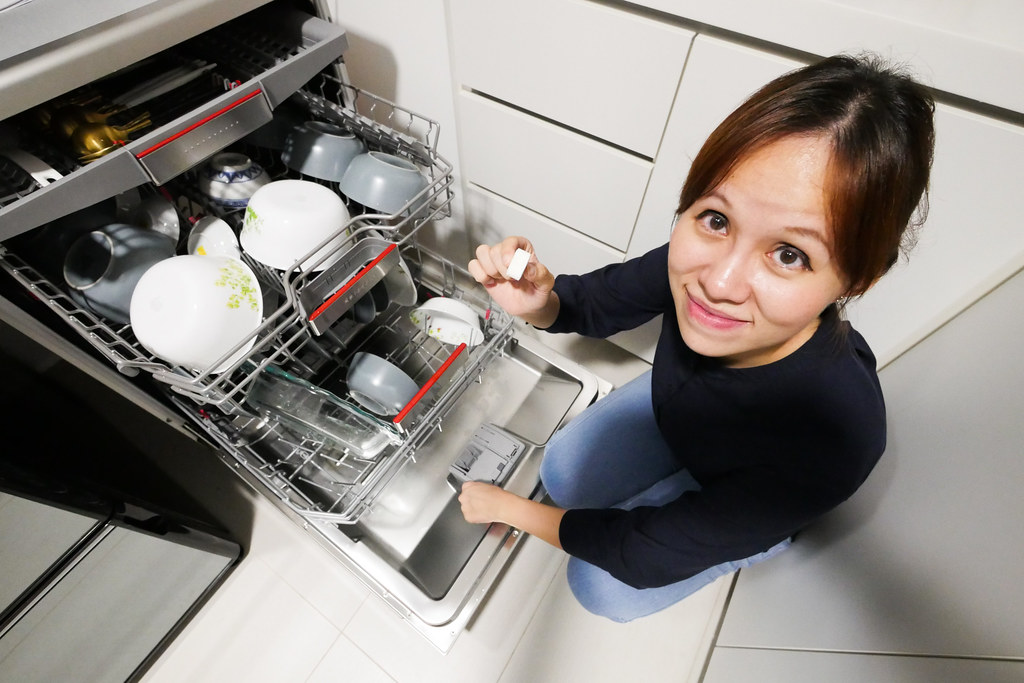
Most important question, why do I need a dishwasher?
Convenience is the key. Even though it is just the two of us, a dishwasher makes life so much simpler. We can just stack the dishes in the dishwasher and only run it after 2-3 meals, when it is full.
How much water does a dishwasher consume compared to hand-washing?
There is a myth that a dishwasher uses a lot of energy and water. In fact, compared to washing dishes by hand, dishwashers use way lesser water. A dishwasher uses, on average, 10-14 liters of water (depending on the model) whereas hand-washing requires 30-40 liters.
Will my electricity bill shoot up after using the dishwasher?
A dishwasher is quite energy efficient as it uses only 1-2 kW of energy each wash (depending on the chosen program). The electricity consumed is used to heat up the water, which is pumped and recycled around the machine.
Isn’t a dishwasher too expensive?
You must consider that a dishwasher is a long-term investment. On average, a dishwasher has a life span of 10-12 years. There are other advantages of having a dishwasher – better hygiene, convenience, no breakages of expensive crockery, more quality time for yourself and more.
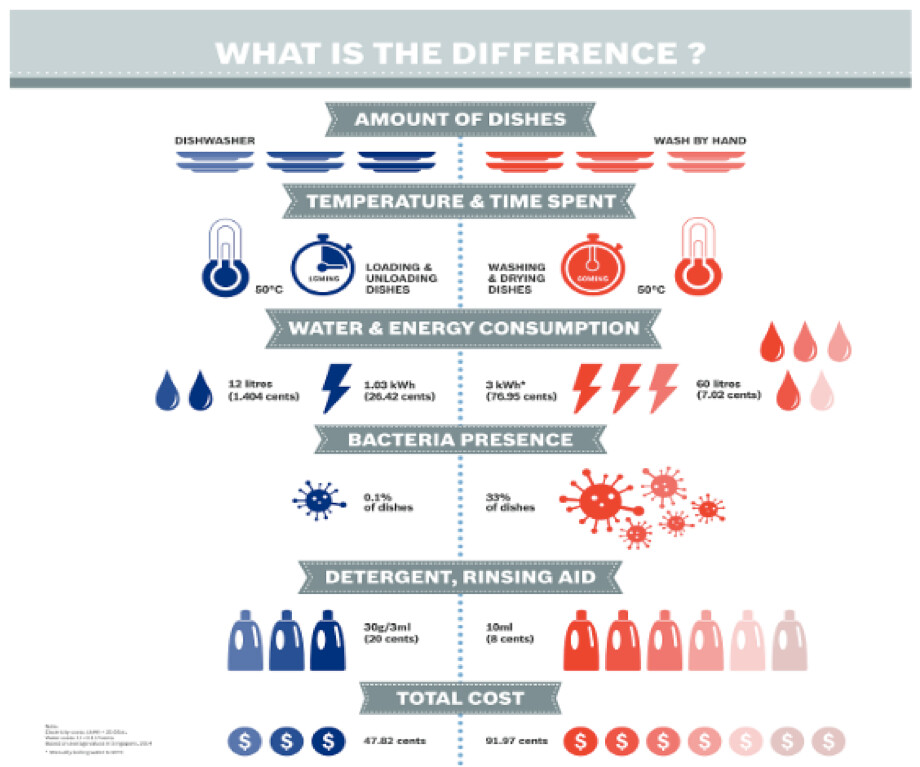
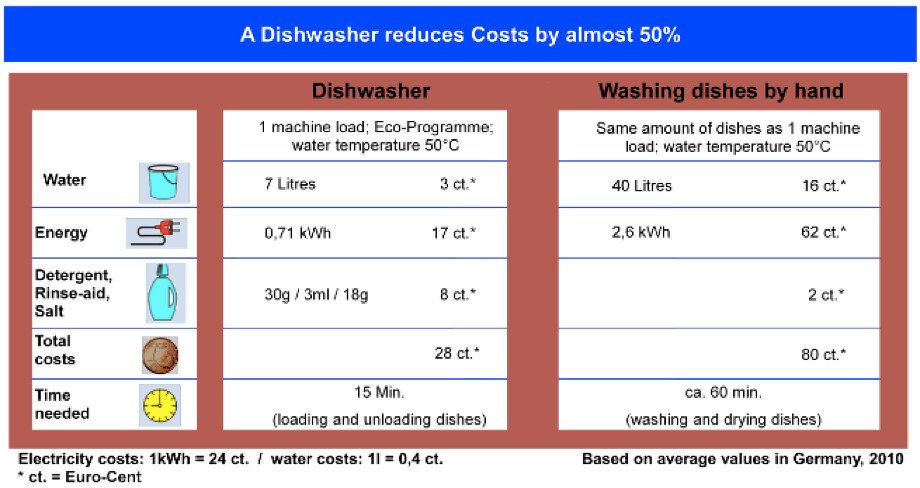
How does a dishwasher work?
After loading the dishwasher, and switching on the program that you wish to run, the dishwasher draws water & sprays water through jets to rinse the dishes. It then releases detergent and the dishes are cleaned with soapy hot water. Once the cleaning process is done, the dishwasher rinses the dishes again. Lastly, the dishwasher dries the dishes.
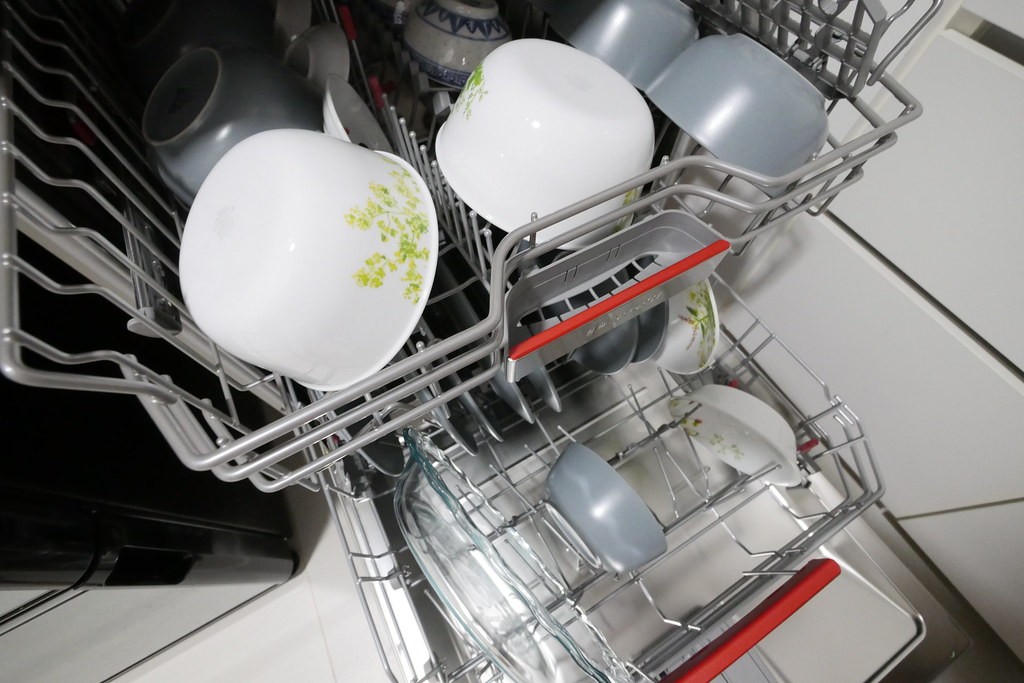
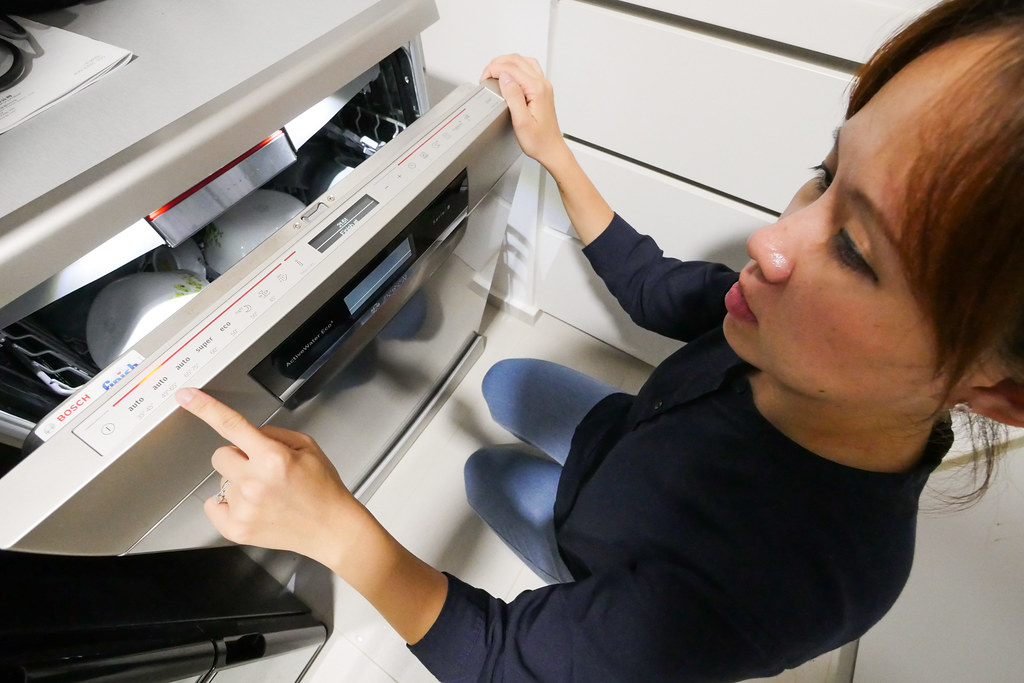
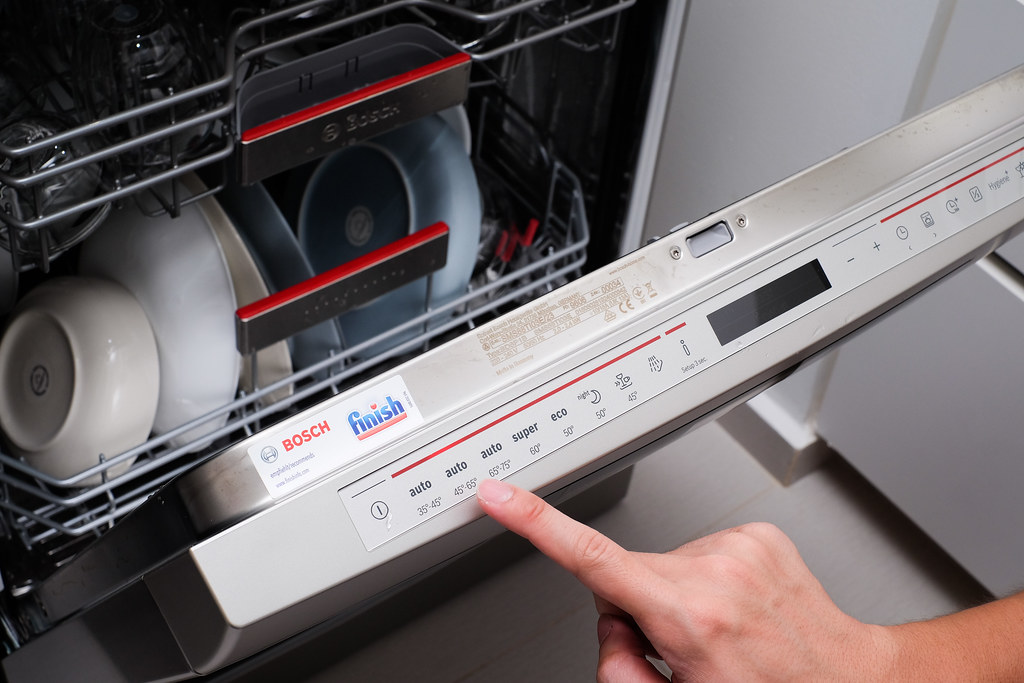
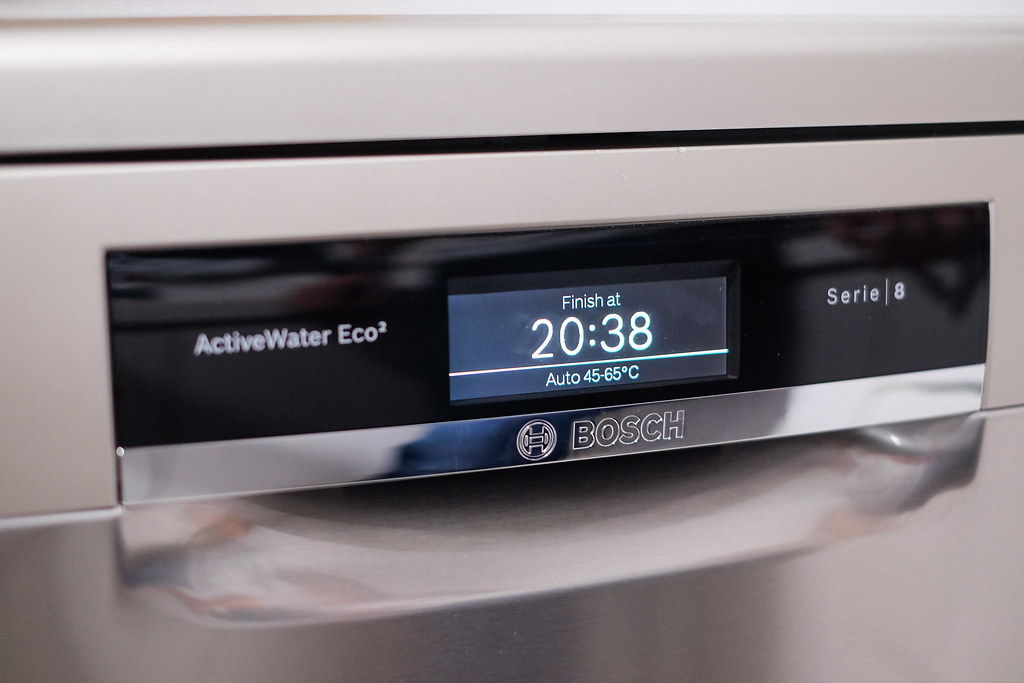
Is a dishwasher suited for oily dishes?
Yes! The dishes I cooked are all very oily and we always had a hard time washing them in the sink. However, with a dishwasher, I just have to put all the plates in, and the machine will work its magic and remove all the grease and oil.
How many utensils can a dishwasher hold?
A normal dishwasher has 12 place settings, this means that it can hold:
– Dinner plate – 12 nos.
– Dessert plate – 12 nos.
– Glass tumbler – 12 nos.
– Tea cup and saucer – 12 nos
– Knives, forks, soup spoons, dessert spoons and teaspoons – 12 nos. each.
– Serving plates and serving spoons – 3-4 nos.
– Bowls – 12 nos.
For a mixed load – it can accommodate pots, pans, plates, cooker & 30 to 40 standard size spoons & forks.
How much time does it need to wash the dishes?
Depending on the wash cycle, it may take between 30 minutes to 2 hours to clean and dry the dishes. It is not necessary to watch your dishwasher as it is completely safe to leave it operating on its own. Just look forward to dry and clean dishes after. My Bosch dishwasher always displays the time that the cleaning will end.
How hygienic are the washing results of a dishwasher, compared to manual washing?
Dishwasher is better than manual-washing because:
1. Manual-washing is usually done with cold water whereas a dishwasher uses hot water which kills germs during the washing cycle.
2. The dishes come out dry which means that there is no need for drying them manually afterwards or leaving them out to dry – which reduces dust accumulation on the dishes.
3. The sponge used in manual-washing accumulates and breeds germs, which is not hygienic
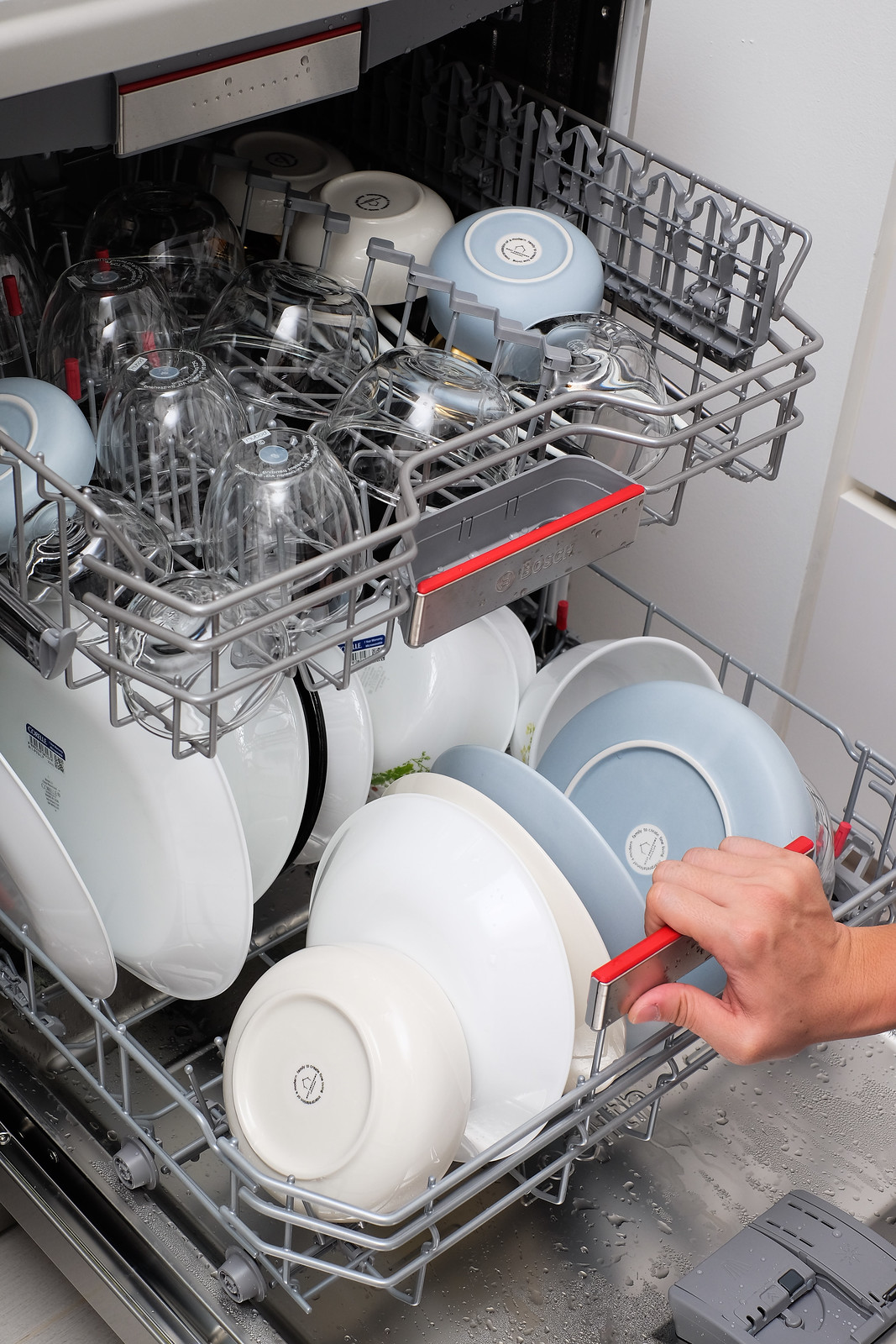
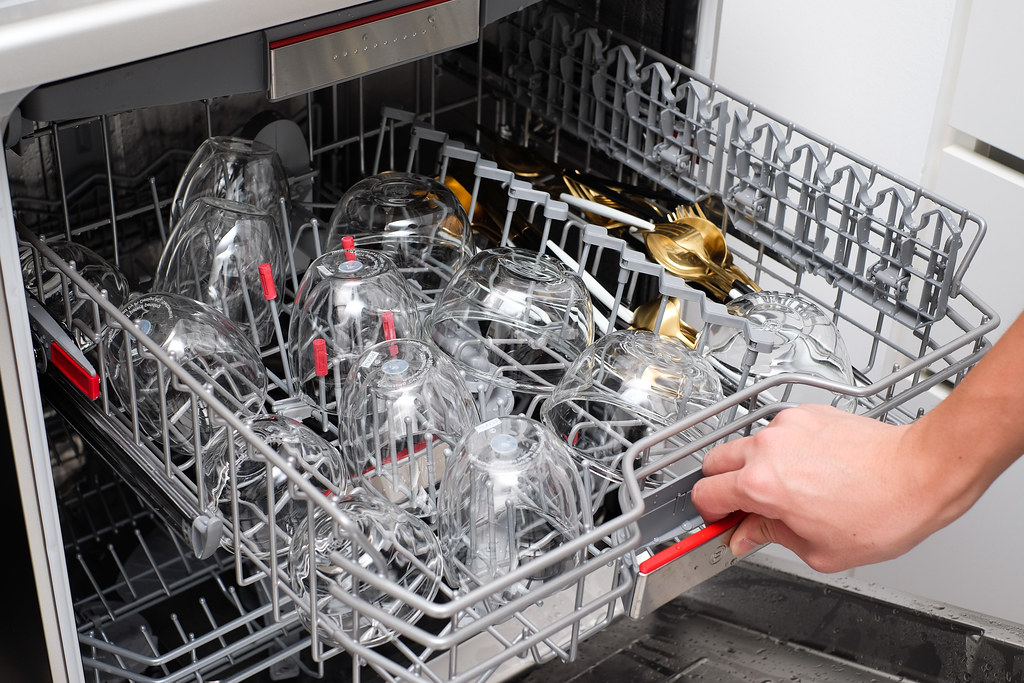
Don’t worry! Glassware is suitable for dishwasher. The upper basket can be used to hold small plates, bowls, glass tumblers and wine glasses. The glass pieces will not get chipped or broken in the dishwasher if you place them properly.
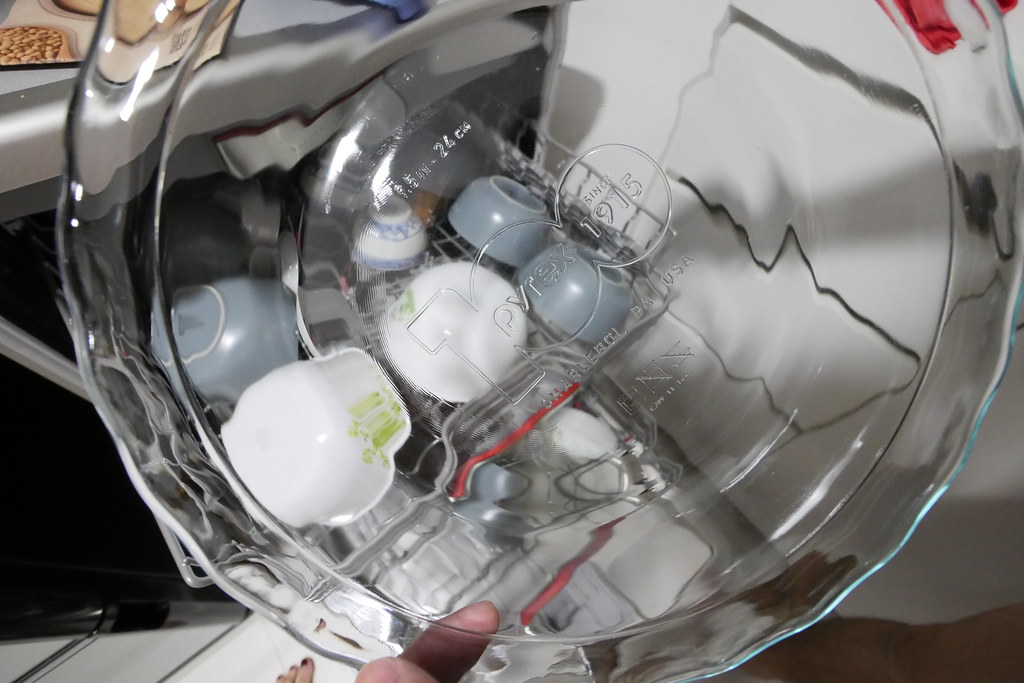
How to select a dishwasher?
It really boils down to your needs. For us, space is a constraint. As much as I want to get a built-in dishwasher, there is no space for it and it means that we have to redo the whole kitchen. So the next sensible choice was to get a free standing dishwasher.
It’s always good to prioritise convenience when buying a dishwasher. This includes adjustable racks and lots of flatware slots. Some mid-priced dishwashers have racks that allow you to lay down large utensils or other dinnerware. Even though we are a two-person family, I host dinners regularly for my friends and family. Hence a upper-lower rack wash feature is neccessary.
The next factor is price. There are different types of Bosch dishwashers which are equipped with different features and they are priced differently, of course. Generally, their free standing dishwasher ranges from $1599 to $2799. The more premium models tend to be quieter and have ample flatware slots, folding tines, and other flexible-loading features. Hidden controls and a cycle-time display add style and convenience.
Different types of dishwasher
Freestanding:
• These dishwashers can be installed anywhere in your kitchen
• Designed to stand alone
• Removable worktop to accommodate benchtop height
• Elegant curved fascia
Built-under:
• Flat control panel
• Adjustable height for flush fit
• Option of continuous kick panel flush with kitchen cabinetry
Semi-integrated:
• Integrate your dishwasher for a seamless look
• Can be fitted with a door panel to match the design of your kitchen cabinetry
• Continuous kick panel provides seamless integration
Fully-integrated:
• Designed to fit your new kitchen to perfection
• Can be concealed entirely behind a door panel to matching your kitchen cabinetry
• Control panel neatly integrated into the top of the dishwasher door
• Continuous kick panel providing seamless integration
• Optional stainless steel front panel
Slimline:
• These slimline 45cm dishwashers are ideal for kitchens where space is at a premium
• Available as a freestanding stand-alone model
• Built-under models with adjustable height for a flush fit
• Fully integrated models can be concealed behind a door panel to match your kitchen cabinetry
Table Top Compact:
• Takes up the least space
• Does not require any plumbing
• Most affordable option
Find the Best Features
Owning a dishwasher for me means I can save time, money, and effort. A big thank you to the kind folks of Bosch for the recommendation, I have gotten Bosch ActiveWater 60 cm Dishwasher (Model: SMS88TI03E) that suits my lifestyle.
Using a Bosch dishwasher saves up to FIVE TIMES more water as compared to washing dishes by hand. An innovative function, VarioSpeed, reduces washing time by 50% as compared to traditional wash programs. Its Super 60°C programme makes it brilliant for cleaning and drying. Additionally, Bosch dishwashers are triple-A rated for energy efficiency, washing and drying performance. How much water did we use? Just 7.5L of water to produce optimum results.
Bosch dishwashers can be purchased at the newly-revamped Bosch Experience Centre or any major electrical appliance stores. For more information, visit www.bosch-home.com.sg/



